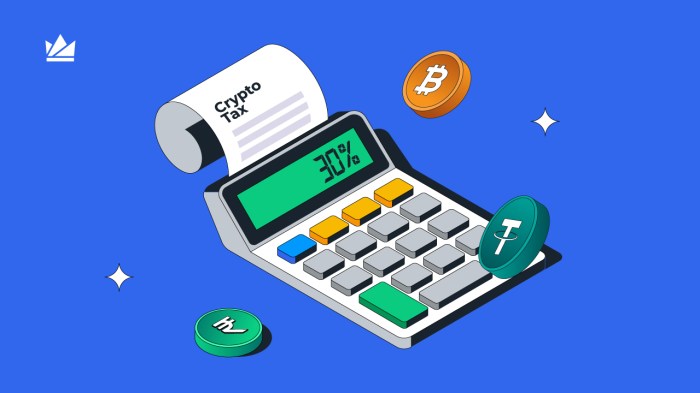The Ultimate Guide to Crypto Taxes for Freelancers and Investors

The Ultimate Guide to Crypto Taxes for Freelancers and Investors sets the stage for this enthralling narrative, offering readers a glimpse into a story that is rich in detail and brimming with originality. From understanding crypto taxes to navigating international implications, this guide covers it all in a comprehensive yet accessible manner.
Overview of Crypto Taxes

Cryptocurrency taxes are a crucial aspect for freelancers and investors who engage in buying, selling, or trading digital assets. These taxes are imposed by tax authorities to ensure that individuals pay taxes on their crypto-related activities.Key Differences:
Differences Between Crypto Taxes and Traditional Taxes
- Volatility: Cryptocurrency prices can fluctuate significantly, leading to potential gains or losses that need to be reported.
- Regulatory Environment: Crypto tax regulations are still evolving and can vary by country, making it essential to stay informed.
- Record-Keeping: Keeping track of crypto transactions is more complex than traditional assets and requires meticulous record-keeping.
- Reporting Requirements: Crypto tax reporting often involves additional forms and disclosures compared to traditional taxes.
Importance of Compliance:
Importance of Understanding and Complying with Crypto Tax Regulations
- Avoid Penalties: Failure to comply with crypto tax regulations can result in penalties, fines, or even legal action.
- Legal Obligation: It is legally required to report crypto transactions and pay taxes on any gains made from these activities.
- Financial Planning: Understanding crypto taxes allows freelancers and investors to plan their finances effectively and avoid any surprises come tax season.
Taxable Events in Cryptocurrency
When it comes to cryptocurrency, there are several taxable events that freelancers and investors need to be aware of in order to report their taxes accurately.
Trading Cryptocurrencies
One of the most common taxable events in cryptocurrency is trading. This includes buying, selling, or exchanging one cryptocurrency for another. Each trade is considered a taxable event, and any gains or losses must be reported on your taxes.
Mining Cryptocurrencies
Mining cryptocurrencies is another taxable event. When you successfully mine a new coin, it is considered income and must be reported as such. The value of the coins at the time they were mined is used to determine the taxable amount.
Receiving Payments in Cryptocurrencies
Receiving payments in cryptocurrencies for goods or services is also a taxable event. The value of the cryptocurrency received is considered income and must be reported on your taxes. It is crucial to keep accurate records of these transactions to ensure compliance with tax laws.
Reporting Cryptocurrency Gains and Losses

When it comes to reporting cryptocurrency gains and losses, it is essential for freelancers and investors to accurately calculate these figures in order to comply with tax regulations and minimize potential liabilities.To calculate gains and losses from cryptocurrency transactions, individuals need to subtract the cost basis of the coins sold from the proceeds of the sale.
The resulting figure represents either a capital gain or loss, depending on whether the proceeds are higher or lower than the initial investment.
Methods for Calculating Gains and Losses
There are different methods for calculating gains and losses from cryptocurrency transactions, with FIFO (First In, First Out) and LIFO (Last In, First Out) being the most commonly used.
- FIFO: This method assumes that the first coins purchased are the first ones sold. It is a straightforward approach that is often preferred for tax purposes.
- LIFO: On the other hand, LIFO assumes that the most recently acquired coins are the first ones sold. While this method can be beneficial during times of price appreciation, it may result in higher capital gains.
Strategies for Minimizing Tax Liabilities
To minimize tax liabilities related to gains and losses from cryptocurrency transactions, individuals can consider the following strategies:
- Harvesting losses: Selling assets that have experienced losses to offset gains in other investments.
- Utilizing tax-advantaged accounts: Investing in cryptocurrencies through retirement accounts or other tax-advantaged vehicles to defer taxes on gains.
- Keeping detailed records: Maintaining accurate records of all transactions to ensure proper reporting and documentation for tax purposes.
Deductions and Credits for Crypto Activities
When it comes to crypto activities, there are potential deductions and credits that freelancers and investors can take advantage of to minimize their tax burden.
Potential Deductions for Crypto Activities
- Costs related to mining activities, including equipment, electricity, and maintenance expenses.
- Transaction fees paid on cryptocurrency exchanges.
- Professional fees paid to tax advisors or accountants for crypto-related services.
Tax Credits for Crypto Activities
- Research and development (R&D) tax credits for innovative projects involving blockchain technology.
- Energy-efficient cryptocurrency mining activities may qualify for renewable energy credits.
- Investments in qualified Opportunity Zones using cryptocurrency funds may be eligible for tax credits.
Tips for Maximizing Deductions and Credits
- Keep detailed records of all crypto transactions, including purchases, sales, and mining activities.
- Consult with a tax professional who is knowledgeable about cryptocurrencies to ensure you are maximizing your deductions and credits.
- Stay informed about changes in tax laws and regulations related to cryptocurrencies to take advantage of any new credits or deductions that may become available.
Record-Keeping and Documentation
When it comes to dealing with cryptocurrency taxes, record-keeping and documentation play a crucial role in ensuring accurate reporting and compliance with tax regulations. By maintaining organized records of your crypto transactions and holdings, you can streamline the tax filing process and avoid any potential issues with the authorities.
Designing a System for Tracking Cryptocurrency Transactions and Holdings
Creating a system for tracking your cryptocurrency transactions and holdings is essential for accurate tax reporting. Consider using a spreadsheet or specialized software to record details such as date of transaction, type of transaction (buy/sell/exchange), amount of cryptocurrency involved, value in fiat currency at the time of transaction, and any associated fees.
It's also important to categorize your transactions based on taxable events, such as capital gains or losses, to simplify the calculation of your tax liability.
Organizing Necessary Documentation for Tax Reporting
Organizing the necessary documentation for tax reporting is key to ensuring transparency and accuracy in your filings. Keep records of all your cryptocurrency transactions, including receipts, invoices, bank statements, and any other relevant documents that support the information reported on your tax return.
Make sure to maintain backups of your records in a secure location, such as a cloud storage service, to prevent loss of data and to have easy access when needed for tax purposes.
Best Practices for Maintaining Records
- Regularly update your records: Make it a habit to record your cryptocurrency transactions as soon as they occur to avoid any discrepancies or missing information.
- Keep detailed notes: Include additional information like the purpose of the transaction, the counterparty involved, and any other relevant details that may help in the future.
- Separate personal and business transactions: If you use cryptocurrency for both personal and business purposes, maintain separate records to accurately reflect the nature of each transaction.
- Consult with a tax professional: Seek guidance from a tax professional to ensure that your record-keeping practices align with tax regulations and best practices for accurate reporting.
International Tax Implications
When it comes to crypto taxes for freelancers and investors, international transactions can introduce a whole new level of complexity. Understanding how these transactions impact your tax obligations is crucial to stay compliant with the law.Foreign account reporting requirements for cryptocurrency holdings are another important aspect to consider.
Depending on where you hold your crypto assets, you may need to disclose this information to tax authorities. Failure to do so can result in penalties or legal consequences.
Navigating International Tax Implications
- Research the tax laws and regulations in each country where you conduct crypto transactions to ensure compliance.
- Consult with a tax professional who specializes in international tax matters to help you navigate the complexities of reporting crypto transactions across borders.
- Keep detailed records of all international transactions involving cryptocurrency to accurately report gains and losses in each jurisdiction.
- Consider any tax treaties or agreements that may exist between countries to avoid double taxation on your crypto income.
Final Summary
In conclusion, the Ultimate Guide to Crypto Taxes for Freelancers and Investors serves as a valuable resource for anyone delving into the world of cryptocurrency. By providing insights on taxable events, reporting gains and losses, deductions, and international tax implications, this guide equips readers with the knowledge needed to tackle their crypto tax obligations effectively.
Questions and Answers
What are some common taxable events for freelancers and investors in the crypto space?
Common taxable events include trading cryptocurrencies, mining activities, and receiving payments in digital assets.
How can one minimize tax liabilities related to gains and losses from cryptocurrency transactions?
Strategies for minimizing tax liabilities include properly documenting transactions, utilizing tax credits, and maximizing deductions.
What are the key differences between crypto taxes and traditional taxes that freelancers and investors should be aware of?
One key difference is the treatment of cryptocurrency as property for tax purposes, leading to unique reporting requirements.

